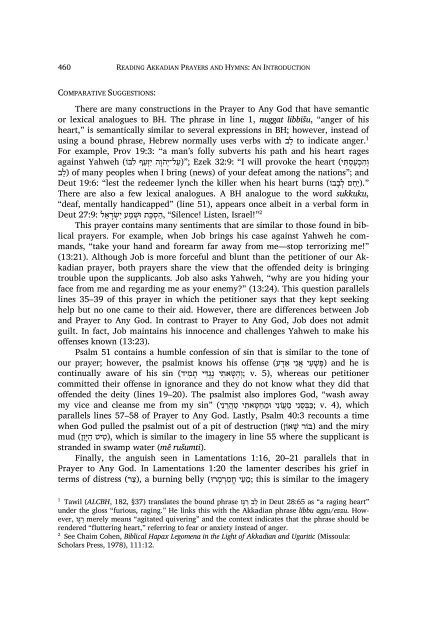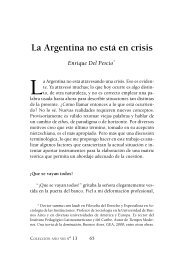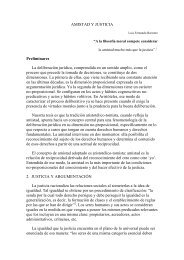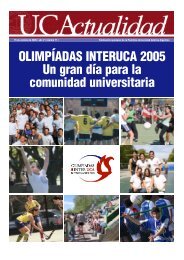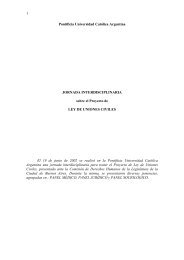- Page 1:
Reading akkadian PRayeRs & Hymns An
- Page 4 and 5:
ancient near east monographs Genera
- Page 6 and 7:
Copyright © 2011 by the society of
- Page 8 and 9:
Shuillas
- Page 11 and 12:
About This Book ALAN LENZI This boo
- Page 13 and 14:
ABOUT THIS BOOK gesammelt und herau
- Page 15 and 16:
ABOUT THIS BOOK Edition: Knowing th
- Page 17 and 18:
ABOUT THIS BOOK Annotations. At the
- Page 19:
ABOUT THIS BOOK Cuneiform. At the e
- Page 22 and 23:
xx READING AKKADIAN PRAYERS AND HYM
- Page 24 and 25:
xxii READING AKKADIAN PRAYERS AND H
- Page 27 and 28:
Introduction ALAN LENZI, CHRISTOPHE
- Page 29 and 30:
INTRODUCTION as a book, a desk, or
- Page 31 and 32:
INTRODUCTION Moreover, without some
- Page 33 and 34:
INTRODUCTION priest of a god, an au
- Page 35 and 36:
INTRODUCTION ideas upon them initia
- Page 37 and 38:
INTRODUCTION ritual speech prayer p
- Page 39 and 40:
INTRODUCTION or petitioning the dei
- Page 41 and 42:
INTRODUCTION As for the first text,
- Page 43 and 44:
INTRODUCTION In discussing these tw
- Page 45 and 46:
INTRODUCTION prayer based on a mode
- Page 47 and 48:
INTRODUCTION ritual speech prayer p
- Page 49 and 50:
INTRODUCTION prayers in this volume
- Page 51 and 52:
INTRODUCTION BaghM 34 (2003), 181-9
- Page 53 and 54:
INTRODUCTION divine images. 67 This
- Page 55 and 56:
INTRODUCTION ritual expert presided
- Page 57 and 58:
INTRODUCTION number of distinctive
- Page 59 and 60:
INTRODUCTION archival purposes, for
- Page 61 and 62:
INTRODUCTION The shuilla-rubric nam
- Page 63 and 64:
INTRODUCTION unsolicited evil signs
- Page 65 and 66:
INTRODUCTION Formally, namburbi-pra
- Page 67 and 68:
INTRODUCTION of this writing.} Kare
- Page 69 and 70:
INTRODUCTION dibbas were “designe
- Page 71 and 72:
INTRODUCTION return to normal” [o
- Page 73 and 74:
INTRODUCTION [t]he term ikribu must
- Page 75 and 76:
INTRODUCTION the ikribu-prayers and
- Page 77 and 78:
INTRODUCTION the OB period). 193 Th
- Page 79 and 80:
INTRODUCTION A standardized formula
- Page 81 and 82:
INTRODUCTION this introduction. Fir
- Page 83 and 84:
INTRODUCTION cations in annalistic
- Page 85 and 86:
INTRODUCTION of oaths, impartial ju
- Page 87 and 88:
INTRODUCTION THE USE OF AKKADIAN PR
- Page 89 and 90:
INTRODUCTION out-of-date. Still, hi
- Page 91 and 92:
INTRODUCTION „Gebetsbeschwörunge
- Page 93 and 94:
INTRODUCTION interpretation of the
- Page 95:
OLD BABYLONIAN TEXTS
- Page 98 and 99:
72 READING AKKADIAN PRAYERS AND HYM
- Page 100 and 101:
74 1. pu-ul-lu-lu ru-bu-ú READING
- Page 102 and 103:
76 READING AKKADIAN PRAYERS AND HYM
- Page 104 and 105:
78 21. li-iz-zi--ú-ma 22. i-na te-
- Page 106 and 107:
80 READING AKKADIAN PRAYERS AND HYM
- Page 108 and 109:
82 READING AKKADIAN PRAYERS AND HYM
- Page 111 and 112:
An OB Ikribu-Like Prayer to Shamash
- Page 113 and 114:
86 READING AKKADIAN PRAYERS AND HYM
- Page 115 and 116:
88 READING AKKADIAN PRAYERS AND HYM
- Page 117 and 118:
90 READING AKKADIAN PRAYERS AND HYM
- Page 119 and 120:
92 READING AKKADIAN PRAYERS AND HYM
- Page 121 and 122:
94 READING AKKADIAN PRAYERS AND HYM
- Page 123 and 124:
96 READING AKKADIAN PRAYERS AND HYM
- Page 125 and 126:
98 62. d INANA be-le-et ta-ḫa-zi-
- Page 127 and 128:
100 READING AKKADIAN PRAYERS AND HY
- Page 129 and 130:
AN OB IKRIBU-LIKE PRAYER TO SHAMASH
- Page 131 and 132:
NINMUG:
- Page 133 and 134:
106 READING AKKADIAN PRAYERS AND HY
- Page 135:
CUNEIFORM:
- Page 138 and 139:
112 READING AKKADIAN PRAYERS AND HY
- Page 140 and 141:
114 READING AKKADIAN PRAYERS AND HY
- Page 142 and 143:
116 READING AKKADIAN PRAYERS AND HY
- Page 144 and 145:
118 READING AKKADIAN PRAYERS AND HY
- Page 146 and 147:
120 READING AKKADIAN PRAYERS AND HY
- Page 148 and 149:
122 READING AKKADIAN PRAYERS AND HY
- Page 150 and 151:
124 READING AKKADIAN PRAYERS AND HY
- Page 152 and 153:
126 READING AKKADIAN PRAYERS AND HY
- Page 154 and 155:
128 READING AKKADIAN PRAYERS AND HY
- Page 156 and 157:
130 READING AKKADIAN PRAYERS AND HY
- Page 159 and 160:
GHOSTS:
- Page 161 and 162:
134 READING AKKADIAN PRAYERS AND HY
- Page 163 and 164:
136 READING AKKADIAN PRAYERS AND HY
- Page 165 and 166:
138 READING AKKADIAN PRAYERS AND HY
- Page 167 and 168:
140 READING AKKADIAN PRAYERS AND HY
- Page 169 and 170:
TRANSLATION:
- Page 171 and 172:
GIRRA:
- Page 173 and 174:
146 READING AKKADIAN PRAYERS AND HY
- Page 175 and 176:
148 READING AKKADIAN PRAYERS AND HY
- Page 177 and 178:
150 READING AKKADIAN PRAYERS AND HY
- Page 179 and 180:
152 READING AKKADIAN PRAYERS AND HY
- Page 181 and 182:
154 READING AKKADIAN PRAYERS AND HY
- Page 183 and 184:
156 READING AKKADIAN PRAYERS AND HY
- Page 185 and 186:
158 READING AKKADIAN PRAYERS AND HY
- Page 187 and 188:
14. di-ni di-na a-lak-ti lim-da
- Page 189 and 190:
26. e-te-bi-ib az-za-ku ki-ma la-á
- Page 191 and 192:
164 READING AKKADIAN PRAYERS AND HY
- Page 193:
166 READING AKKADIAN PRAYERS AND HY
- Page 196 and 197:
170 READING AKKADIAN PRAYERS AND HY
- Page 198 and 199:
172 READING AKKADIAN PRAYERS AND HY
- Page 200 and 201:
174 READING AKKADIAN PRAYERS AND HY
- Page 202 and 203:
176 READING AKKADIAN PRAYERS AND HY
- Page 204 and 205:
178 CUNEIFORM: READING AKKADIAN PRA
- Page 206 and 207:
180 READING AKKADIAN PRAYERS AND HY
- Page 208 and 209:
182 ESSENTIAL BIBLIOGRAPHY: READING
- Page 210 and 211:
184 READING AKKADIAN PRAYERS AND HY
- Page 212 and 213:
186 READING AKKADIAN PRAYERS AND HY
- Page 215 and 216:
SALT:
- Page 217 and 218:
190 THE PRAYER: READING AKKADIAN PR
- Page 219 and 220:
6. up-šá-še-e le-eʾ-bu-in-ni
- Page 221:
194 READING AKKADIAN PRAYERS AND HY
- Page 224 and 225:
198 READING AKKADIAN PRAYERS AND HY
- Page 226 and 227:
200 READING AKKADIAN PRAYERS AND HY
- Page 228 and 229:
202 READING AKKADIAN PRAYERS AND HY
- Page 230 and 231:
204 READING AKKADIAN PRAYERS AND HY
- Page 232 and 233:
206 READING AKKADIAN PRAYERS AND HY
- Page 234 and 235:
208 READING AKKADIAN PRAYERS AND HY
- Page 236 and 237:
210 READING AKKADIAN PRAYERS AND HY
- Page 238 and 239:
212 READING AKKADIAN PRAYERS AND HY
- Page 240 and 241:
214 READING AKKADIAN PRAYERS AND HY
- Page 243 and 244:
ANU:
- Page 245 and 246:
218 READING AKKADIAN PRAYERS AND HY
- Page 247 and 248:
220 READING AKKADIAN PRAYERS AND HY
- Page 249 and 250:
15. dà-lí-lí EN-iá lud-l[ul]
- Page 251 and 252:
224 READING AKKADIAN PRAYERS AND HY
- Page 253 and 254:
EA:
- Page 255 and 256:
228 READING AKKADIAN PRAYERS AND HY
- Page 257 and 258:
230 READING AKKADIAN PRAYERS AND HY
- Page 259 and 260:
9. d a-nu u d EN.LÍL ḫa-diš ri-
- Page 261 and 262:
18. at-mé-e-a li-ṭib UGU DINGIR
- Page 263 and 264:
236 READING AKKADIAN PRAYERS AND HY
- Page 265 and 266:
238 READING AKKADIAN PRAYERS AND HY
- Page 267 and 268:
240 READING AKKADIAN PRAYERS AND HY
- Page 269 and 270:
GULA:
- Page 271 and 272:
244 READING AKKADIAN PRAYERS AND HY
- Page 273 and 274:
246 ESSENTIAL BIBLIOGRAPHY: READING
- Page 275 and 276:
248 READING AKKADIAN PRAYERS AND HY
- Page 277 and 278:
250 READING AKKADIAN PRAYERS AND HY
- Page 279 and 280:
252 READING AKKADIAN PRAYERS AND HY
- Page 281 and 282:
CUNEIFORM:
- Page 283 and 284:
ISHTAR: See page 169. THE PRAYER:
- Page 285 and 286:
258 READING AKKADIAN PRAYERS AND HY
- Page 287 and 288:
260 READING AKKADIAN PRAYERS AND HY
- Page 289 and 290:
262 READING AKKADIAN PRAYERS AND HY
- Page 291 and 292:
264 READING AKKADIAN PRAYERS AND HY
- Page 293 and 294:
266 READING AKKADIAN PRAYERS AND HY
- Page 295 and 296:
268 READING AKKADIAN PRAYERS AND HY
- Page 297 and 298:
270 READING AKKADIAN PRAYERS AND HY
- Page 299 and 300:
272 READING AKKADIAN PRAYERS AND HY
- Page 301 and 302:
274 READING AKKADIAN PRAYERS AND HY
- Page 303 and 304:
276 READING AKKADIAN PRAYERS AND HY
- Page 305 and 306:
278 READING AKKADIAN PRAYERS AND HY
- Page 307 and 308:
280 READING AKKADIAN PRAYERS AND HY
- Page 309 and 310:
282 TRANSLATION: READING AKKADIAN P
- Page 311 and 312:
CUNEIFORM:
- Page 313 and 314:
286 READING AKKADIAN PRAYERS AND HY
- Page 315 and 316:
288 READING AKKADIAN PRAYERS AND HY
- Page 317 and 318:
MARDUK:
- Page 319 and 320:
292 READING AKKADIAN PRAYERS AND HY
- Page 321 and 322:
294 READING AKKADIAN PRAYERS AND HY
- Page 323 and 324:
4. ša-su-ú u la a-pa-lu id-da-ṣ
- Page 325 and 326:
12. lu-ut-ta-id-ma gul-lul-tú la a
- Page 327 and 328:
300 READING AKKADIAN PRAYERS AND HY
- Page 329 and 330:
ana šùl-me u TI.LA piq-dan-ni
- Page 331 and 332:
304 READING AKKADIAN PRAYERS AND HY
- Page 333 and 334:
COMPARATIVE SUGGESTIONS:
- Page 335 and 336:
308 READING AKKADIAN PRAYERS AND HY
- Page 337:
310 READING AKKADIAN PRAYERS AND HY
- Page 340 and 341:
314 READING AKKADIAN PRAYERS AND HY
- Page 342 and 343:
316 READING AKKADIAN PRAYERS AND HY
- Page 344 and 345:
318 READING AKKADIAN PRAYERS AND HY
- Page 346 and 347:
320 READING AKKADIAN PRAYERS AND HY
- Page 348 and 349:
322 READING AKKADIAN PRAYERS AND HY
- Page 350 and 351:
324 READING AKKADIAN PRAYERS AND HY
- Page 352 and 353:
326 THE PRAYER: READING AKKADIAN PR
- Page 354 and 355:
328 READING AKKADIAN PRAYERS AND HY
- Page 356 and 357:
330 READING AKKADIAN PRAYERS AND HY
- Page 358 and 359:
332 READING AKKADIAN PRAYERS AND HY
- Page 360 and 361:
334 READING AKKADIAN PRAYERS AND HY
- Page 362 and 363:
336 READING AKKADIAN PRAYERS AND HY
- Page 365 and 366:
NERGAL:
- Page 367 and 368:
340 READING AKKADIAN PRAYERS AND HY
- Page 369 and 370:
6. ra-ba-ta ina É.KUR.ÚŠ ma-ḫi
- Page 371 and 372:
344 READING AKKADIAN PRAYERS AND HY
- Page 373 and 374:
25. ka-inim-ma šu-íl-lá d u-gur-
- Page 375:
348 READING AKKADIAN PRAYERS AND HY
- Page 378 and 379:
352 READING AKKADIAN PRAYERS AND HY
- Page 380 and 381:
354 READING AKKADIAN PRAYERS AND HY
- Page 382 and 383:
356 READING AKKADIAN PRAYERS AND HY
- Page 384 and 385:
358 READING AKKADIAN PRAYERS AND HY
- Page 386 and 387:
360 READING AKKADIAN PRAYERS AND HY
- Page 388 and 389:
362 READING AKKADIAN PRAYERS AND HY
- Page 390 and 391:
364 READING AKKADIAN PRAYERS AND HY
- Page 392 and 393:
366 READING AKKADIAN PRAYERS AND HY
- Page 394 and 395:
368 READING AKKADIAN PRAYERS AND HY
- Page 396 and 397:
370 READING AKKADIAN PRAYERS AND HY
- Page 398 and 399:
372 READING AKKADIAN PRAYERS AND HY
- Page 400 and 401:
374 READING AKKADIAN PRAYERS AND HY
- Page 402 and 403:
376 READING AKKADIAN PRAYERS AND HY
- Page 404 and 405:
378 READING AKKADIAN PRAYERS AND HY
- Page 406 and 407:
380 READING AKKADIAN PRAYERS AND HY
- Page 408 and 409:
382 READING AKKADIAN PRAYERS AND HY
- Page 410 and 411:
384 READING AKKADIAN PRAYERS AND HY
- Page 412 and 413:
386 READING AKKADIAN PRAYERS AND HY
- Page 414 and 415:
388 READING AKKADIAN PRAYERS AND HY
- Page 416 and 417:
390 READING AKKADIAN PRAYERS AND HY
- Page 418 and 419:
392 READING AKKADIAN PRAYERS AND HY
- Page 420 and 421:
394 READING AKKADIAN PRAYERS AND HY
- Page 422 and 423:
396 READING AKKADIAN PRAYERS AND HY
- Page 424 and 425:
398 READING AKKADIAN PRAYERS AND HY
- Page 426 and 427:
400 READING AKKADIAN PRAYERS AND HY
- Page 428 and 429:
402 READING AKKADIAN PRAYERS AND HY
- Page 430 and 431:
404 READING AKKADIAN PRAYERS AND HY
- Page 432 and 433:
406 READING AKKADIAN PRAYERS AND HY
- Page 434 and 435:
408 READING AKKADIAN PRAYERS AND HY
- Page 436 and 437: 410 READING AKKADIAN PRAYERS AND HY
- Page 438 and 439: 412 READING AKKADIAN PRAYERS AND HY
- Page 440 and 441: 414 READING AKKADIAN PRAYERS AND HY
- Page 442 and 443: 416 READING AKKADIAN PRAYERS AND HY
- Page 444 and 445: 418 READING AKKADIAN PRAYERS AND HY
- Page 447 and 448: SHAMASH:
- Page 449 and 450: 422 READING AKKADIAN PRAYERS AND HY
- Page 451 and 452: 9. ŠU.II-ka-ma d UTU 10. a-na-ku
- Page 453 and 454: 426 15. TÚG.SÍG-ka aṣ-bat 16. i
- Page 455 and 456: 428 26. lid-lu-lu TE.ÉN READING AK
- Page 457 and 458: 430 CUNEIFORM: READING AKKADIAN PRA
- Page 459 and 460: 432 READING AKKADIAN PRAYERS AND HY
- Page 461 and 462: 3. me-e-ka am-te-eš ma-gal al-lik
- Page 463 and 464: 11. dan-na-at ŠU-ka a-ta-mar še-r
- Page 465 and 466: 20. DINGIR ag-gu lìb-ba-ka li-nu-
- Page 467 and 468: 440 READING AKKADIAN PRAYERS AND HY
- Page 469 and 470: 442 READING AKKADIAN PRAYERS AND HY
- Page 471: 444 READING AKKADIAN PRAYERS AND HY
- Page 474 and 475: 448 READING AKKADIAN PRAYERS AND HY
- Page 476 and 477: 450 READING AKKADIAN PRAYERS AND HY
- Page 478 and 479: 452 READING AKKADIAN PRAYERS AND HY
- Page 480 and 481: 454 28. ik-kib a-ku-lu 4 {ul i-de}
- Page 482 and 483: 456 READING AKKADIAN PRAYERS AND HY
- Page 484 and 485: 458 READING AKKADIAN PRAYERS AND HY
- Page 488 and 489: 462 READING AKKADIAN PRAYERS AND HY
- Page 490 and 491: 464 READING AKKADIAN PRAYERS AND HY
- Page 492 and 493: 466 ESSENTIAL BIBLIOGRAPHY: READING
- Page 494 and 495: 468 READING AKKADIAN PRAYERS AND HY
- Page 496 and 497: 470 READING AKKADIAN PRAYERS AND HY
- Page 498 and 499: 472 READING AKKADIAN PRAYERS AND HY
- Page 500 and 501: 474 READING AKKADIAN PRAYERS AND HY
- Page 502 and 503: 476 READING AKKADIAN PRAYERS AND HY
- Page 504 and 505: 478 READING AKKADIAN PRAYERS AND HY
- Page 506 and 507: 480 READING AKKADIAN PRAYERS AND HY
- Page 509 and 510: MARDUK:
- Page 511 and 512: 484 READING AKKADIAN PRAYERS AND HY
- Page 513 and 514: 486 READING AKKADIAN PRAYERS AND HY
- Page 515 and 516: 488 READING AKKADIAN PRAYERS AND HY
- Page 517 and 518: 490 READING AKKADIAN PRAYERS AND HY
- Page 519 and 520: 492 READING AKKADIAN PRAYERS AND HY
- Page 521 and 522: 494 READING AKKADIAN PRAYERS AND HY
- Page 523 and 524: 496 READING AKKADIAN PRAYERS AND HY
- Page 525 and 526: TRANSLATION:
- Page 527: 500 CUNEIFORM: READING AKKADIAN PRA
- Page 531 and 532: Acrostics, 60 Adad, introduction to
- Page 533 and 534: Berlejung, Angelika, 27, 105, 230,
- Page 535 and 536: Loud, Gordon, 56 Luckenbill, Daniel
- Page 537 and 538:
MAYER’S INCANTATION-PRAYERS (besi
- Page 539 and 540:
Ishtar Queen of Heaven · 61 JNES 3
- Page 541 and 542:
HEBREW BIBLE Genesis 1:16, 253 1:26
- Page 543 and 544:
44:2, 195 44:7, 125 45:3,4, 240 45:
- Page 545 and 546:
130:6, 498 134:1-2, 239 136:9, 253
- Page 547:
There are few resources for student


